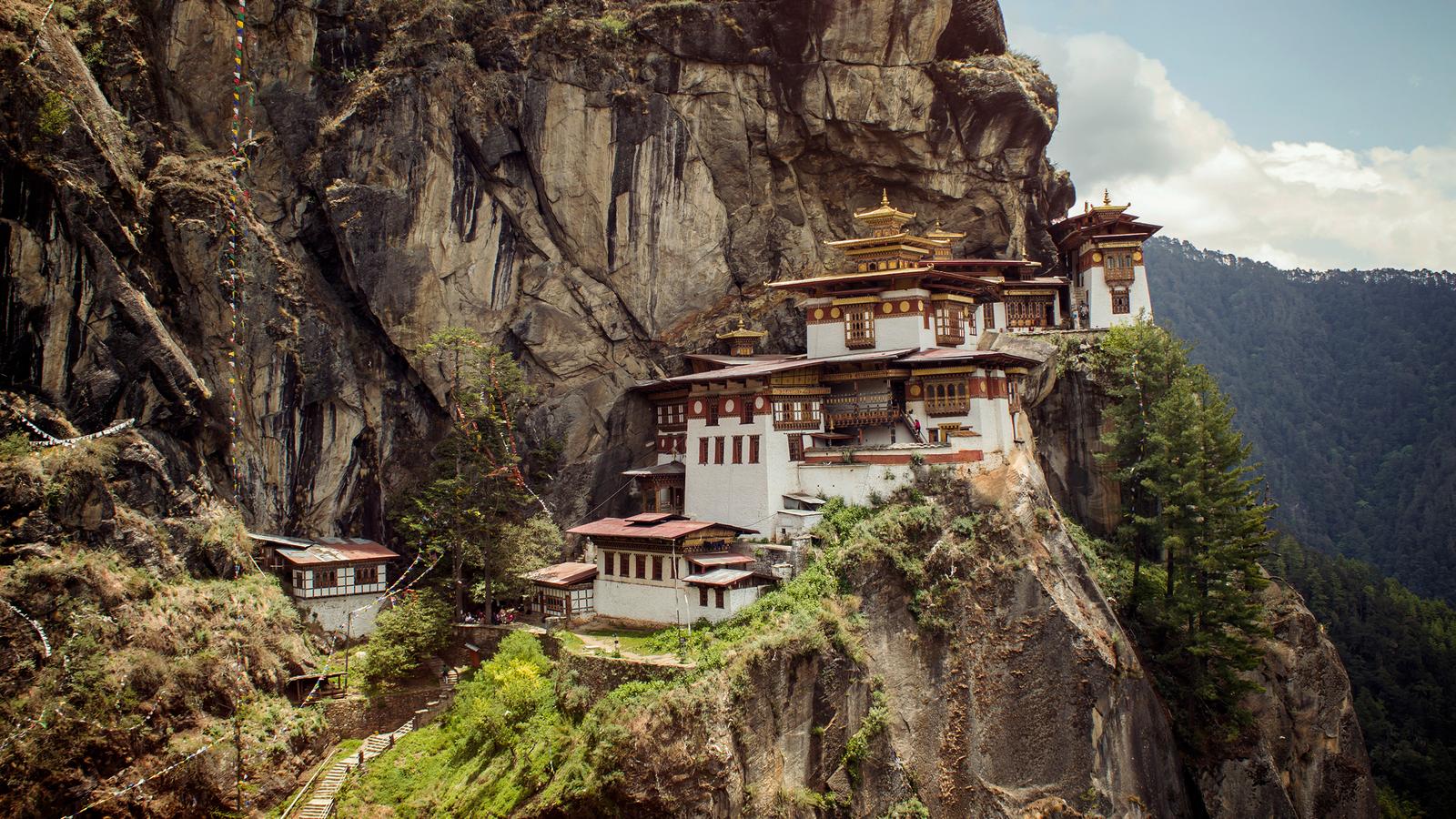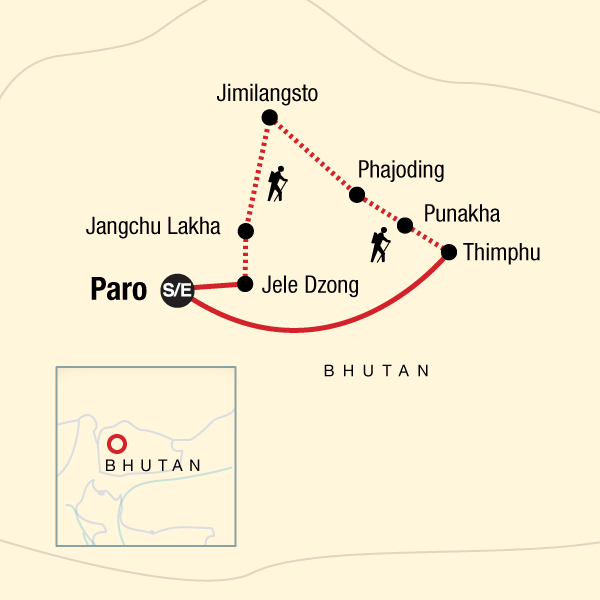Sorry! There are no remaining departures for "Bhutan Trekking - The Druk Path" (ADDP), but here are some similar trips.
Bhutan Trekking - The Druk Path
11 days, Paro to Paro
Itinerary
Day 1Paro
Arrive at any time, arrival transfer included. Take an orientation walk of Paro town.
Arrive in Bhutan, clear customs, and meet your CEO. Catch the included transfer to the hotel.
Meals included:
DinnerDay 2Paro
Drive to the Chelela Pass before then hike to Kila Goempa, a nunnery perched on a cliff housing over 60 nuns.
Kila Goempa Nunnery Hike
Hike through the deep forest of pine trees and rhododendrons to Kila Goempa nunnery (approx 2.5 hrs). It seems to cling to a rocky cliff and houses around 60-70 nuns. This is a moderate level hike through stunningly beautiful scenery.
Meals included:
Breakfast | Lunch | DinnerDay 3Paro/Jele Dzong
Drive to Ta Dzong and begin the hike along the Druk Path. Enjoy a gradual climb with stunning views of the Paro valley, Mt. Jomolhari (7314m) and snowcapped mountains. Finishing the day's journey at Jele Dzong camp.
Druk Path Hike Day 1
Starting at Ta Dzong (2300m/7546 ft.), trek along a trail with a gradual climb towards camp. If the weather is clear the Paro valley can be seen with Mount Jhomolhari (7314m/23996 ft.) and other snow-capped mountains beyond the valley. Camp at Jele Dzong (3436m).
Meals included:
Breakfast | Lunch | DinnerDay 4Jele Dzong/Jimilangtsho
Continue hiking along a ridge, enjoying the spectacular mountain scenery and flowering rhododendron bushes around the trail. Pass by Jimelangtsho where you may see Yak herders and can visit their tents before reaching camp at Tshokam.
Druk Path Trek Day 2
Start at Jele Dzong (3436mtrs) along a trail through thick alpine forest and rhododendron trees. The walking on this day is along the ridge, with a fair amount of ascents and descents. Mt. Jhomolhari will be visible on this day. Pass by Jimelangtsho where you may see Yak herders and if you are interested you can visit their tents before reaching your camp site. Camp is close by at Tshokam (3880m/12730 ft).
Meals included:
Breakfast | Lunch | DinnerDay 5Jimilangtsho/Simkotra
Continue the hike through the mountains, ending the day at Simkotra camp near the lake.
Druk Path Trek Day 3
The trail continues through dwarf rhododendron trees before passing by Janye Tsho Lake. On the route, you might see some Yak herder’s camp and see how some of the Bhutanese people live. Camp close to Simkotra Lake(4040m/13255 ft).
Meals included:
Breakfast | Lunch | DinnerDay 6Simkotra/Thimphu
Enjoy a final day hikking up to Phume, the highest elevation on our trek. Continue downhill with stunning views of the valley, ending in Thimpu.
Druk Path Trek Day 4
Our longest day of the trek, first hike up to Phume (4210m), the highest elevation on our trek. Continue downhill past the lake of Janye Tshowith, through blue pine forest with stunning views of the valley, to Thimphu (2300m/7545 ft). The trek is mostly downhill through blue pine forest.
Meals included:
Breakfast | Lunch | DinnerDay 7Thimphu
Spend the day exploring the sights of Thimpu, including the Institute of Traditional Medicine Services and Folk Heritage Museum.
Your Wellness Moment: Institute of Traditional Medicine Services
Visit the Institute of traditional Medicine, where old healing arts such as acupuncture and herbal remedies are still practiced.
Folk Heritage Museum
Explore the Folk Heritage Museum, which preserves the traditional art of weaving through exhibition and has a good collection of old textiles which are rich in colour and design.
Motithang Takin Preserve Visit
Enjoy a visit to the Motithang Takin Preserve, which was once a mini zoo. The area was converted into a preserve for Bhutan's national animal, the takin, which is a cross between a goat and an antelope.
Institute for Zorig Chusum Visit
Enjoy a visit to the Institute for Zorig Chusum, an arts and craft school that's a highlight for those interested in Asian art. The institute was established in 1971 to ensure the continuity of Bhutanese traditional arts. Students study here for 4-6 yrs in various mediums. Explore the institute opt to purchase arts and crafts from the shop.
Kuenselphodrang Visit
Drive up to Kuenselphodrang, and explore the site. The statue of Buddha Drodenma. At 51.5m (169 ft) tall, it is the world’s largest seated Buddha.
Memorial Chorten Visit
The chorten is one of the most prominent religious structures in Thimphu, and for local Bhutanese it is a popular part of their daily prayers. Watch locals walk around the Chorten, spinning the prayer wheels and meditating in this lovely and peaceful spot.
Meals included:
Breakfast | Lunch | DinnerDay 8Thimphu/Punākha
Travel to Punakha and trek to Chime Lhakhang. Also known as the temple of the "Divine Madman," hear stories of the madman's legacy. Later, explore Punakha Dzong, one of Bhutan's most majestic structures.
Punakha Dzong Visit
Visit Punakha Dzong, the winter seat of the Je Khenpo and the Monk Body, remarkably located between the rivers of the Mo (female) Chu and Pho (male) Chu. It is the second oldest and second largest dzong (fortress) in Bhutan and one of its most majestic structures, housing many sacred relics. It is also the winter capital of the Je Khenpo (chief abbot). Built by Zhabdrung Ngawang Namgyal in around 1637. Arguably, it is the most beautiful Dzong in the country. The Dzong guards Bhutan’s most treasured relic, the Rangjung Kharsapani, an image of Chenresig kept away from the public in the utse (tower). It has survived Tibetan invasions, numerous fires, floods and a glacial lake burst. The Dzong served as the capital and seat of the Bhutanese Government until the early 1950s; and the coronation of the His Majesty the First Druk, Gyalpo Ugyen Wangchuck, took place here.
Chime Lhakhang Visit
Take a short hike to Chime Lhakhang, temple of the “Divine Madman." Built in 1499, it is mainly visited today by women as it is known as the temple of fertility.
Private Vehicle
Settle in and scan the scenery from the convenience of a private vehicle.
Meals included:
Breakfast | Lunch | DinnerDay 9Punākha/Paro
Enjoy a day of sightseeing in the Paro valley and gain a deeper understanding of the country's history. Explore Kyichu Lhakhang, one of Bhutan's oldest monasteries, before learning about the national sport with a visit to a local archery ground.
Private Vehicle
Settle in and scan the scenery from the convenience of a private vehicle.
Kyichu Lhakhang Temple Visit
Enjoy a visit to one of Bhutan's oldest and most beautiful temples. Built in the 7th century, Kyichu Lhakhang Temple boasts stunning art work inside and throughout the courtyards.
Local Archery Grounds Visit
As Bhutan's national sport, a visit to a local archery ground is a must. Watch locals practice or compete with unbelievable accuracy and precision as they hit distant targets.
Meals included:
Breakfast | Lunch | DinnerDay 10Paro
Explore Drugyel Dzong, a ruined castle that has repelled many invasions, before hiking through the mountains to the stunning Taktsang Monastery (Tiger's Nest).
Drukgyal Dzong Visit
Drive the winding road to Drukgyal Dzong, a ruined fortress that once defended this valley from Tibetan invasions. In the early 1950s, Drukgyal Dzong was almost completely destroyed by fire.
Taktsang (Tiger’s Nest) & Monastery Hike
Hike up to the Taktsang monastery (Tiger’s Nest); containing 13 holy relics, it's considered one of the most venerated pilgrim sites of the Himalayan world. It is also where Guru Padmasambhava is said to have landed on the back of a tigress in the 8th century. Take in the stunning views en route and the incredible vista from this monastery, which clings to the rock towering 2,953m above the valley.
The group will hike from 2400m elevation and reach 3100m at the Taktsang Monastery before returning back to 2400m in the same day. The climb should take around 6 hours for a total distance of 7 km.
Meals included:
Breakfast | Lunch | DinnerDay 11Paro
Depart at any time.

